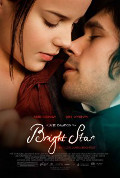
Directed by
Jane Campion
119 minutes
Rated PG
Reviewed by
Sharon Hurst

Bright Star
Synopsis: First love is perhaps the most romantic time of anyone’s life, and one of the most famous is the love affair between poet John Keats (Ben Wishaw) and his 18-year-old neighbour Fanny Brawne (Abbie Cornish). In 1819 Keats and his friend Charles Brown (Paul Schneider) move next door to the Brawne family who live in the idyllic Hampstead Village in outer London. Together Fanny and John discover love yet his illness and society’s mores will conspire to keep them apart.Keats is considered the greatest of the Romantic poets. Some of his most iconic works, Ode to a Nightingale and Bright Star were written as he fell deeply in love (albeit unconsummated) with Fanny Brawne, but was unable to marry her, as in those days a young woman required a husband with means to support her and a struggling poet didn’t fit the bill.
Now you may think, “here comes another tired period piece with starched linen, corsets, suppressed sexuality and frightfully English sensibility.” Well you’d be wrong! This exquisite film could almost define what for me is the essence of the word "romantic". There is a softness, tenderness, longing, pain and beauty seldom seen in love stories on screen whilst all the formal aspects – the casting, the script (by Campion working from a biography of Keats by Andrew Motion), the cinematography by Greig Fraser and the score by Mark Bradshaw - work together seamlessly
The story is told through the eyes of the feisty, forthright Fanny. She is a young woman with a creative bent, designing and making beautiful clothes, but initially seen by Keats and particularly the possessive Brown as a flirtatious, inconsequential minx. But she wants to learn about poetry,\ and who better to teach her than her young neighbour?. Cornish is translucent as Keats’ muse – the depth of emotion, grief and longing she brings to many of the scenes is absolutely convincing. Wishaw strikes just the right balance between artistic sensitivity and gentlemanly behaviour with his Keats, whose inspired words and tragic death at only 25 rendered him immortal. Schneider fascinated me with his compelling portrayal of Brown – a domineering, sarcastic man who perhaps had certain feeling for Keats himself, and whose jealousy and chauvinism is palpable. Strong support comes from Kerry Fox as Fanny’s sympathetic loving mother, while Thomas Sangster (who can also be seen currently as Paul McCartney in Nowhere Boy) and the angelic Edie Martin play Fanny’s brother, Samuel, and sister, Toots.
Keats tells Fanny that a poem needs understanding through the senses and the film reflects this completely. The viewer’s senses can overdose on the visual bounty with so many picturesque scenes which embody the age of romanticism – Fanny in a field of bluebells, Toots collecting daffodils, snow on the English heath, a butterfly farm in the bedroom, close-ups of sewing needles and thread and many more exquisite scenes. Along with the natural beauty goes a simple approach to interiors which never allows the settings to overwhelm the characters and their stories and there is none of the oft-found decorative fussiness of period pieces.
Whilst the story is two centuries old, there is a timeless quality about it that captures the eternal romance of love. Although the characters spout poetry, the dialogue is of another time, and Keats and Fanny never actually engage in more than a kiss there is an emotional intensity that transcends the particularities of time and place. Keats’ words are seamlessly woven throughout the story which itself is like a slowly unfolding poem.
With nominations for Grand Prix at Cannes, Best Actress, Best Director for Campion and Best Technical Achievement for Fraser, Bright Star is a film no self-respecting romantic should miss.

Want more about this film?


Want something different?




